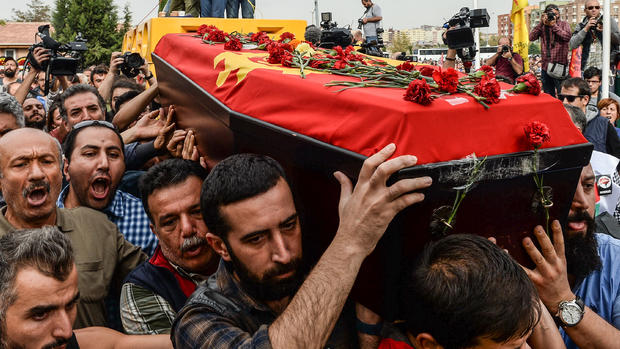Turkey risks serious instability after peace rally blast
ANKARA, Turkey - The suicide bombings that ripped through a rally promoting peace in Turkey's capital have magnified the political uncertainty ahead of a key election Nov. 1 and raised fears that the country may be heading toward an extended period of instability.
The blasts - Turkey's bloodiest in years - have further polarized the country as President Recep Tayyip Erdogan tries again for a ruling majority in parliament. And with political winds blowing against the ruling party, the election could create new power struggles just as the country grapples with more than 2 million refugees and tries to avoid being drawn into the chaos in neighboring Syria and Iraq.
Turkey, which used to be held up as a rare example of stability and democracy in the Middle East, is now looking increasingly unstable, reports CBS News correspondent Holly Williams.
"We are now facing uncharted waters in terms of deadly violence in Turkey," wrote Omer Taspinar of the Brookings Institution in Today's Zaman, an opposition newspaper. "We are also in uncharted waters in terms of political polarization in the country."
Turkey has suffered a spiral of violence since July, when a similar suicide bombing killed 33 Turkish and Kurdish activists in a town near the Syrian border, ending a cease-fire. Kurdish rebels blamed Turkey's government, and hundreds have been killed since then in the renewed conflict with security forces.
As Kurdish politicians tried to lay flowers at the scene of the attack Sunday, there was a confrontation with police, who said investigators were still working at the site.
The attack in the heart of the capital - far from the conflicts bleeding over Turkey's southern borders - is rattling nerves around the nation and beyond.
Amid the turmoil, the Turkish lira is losing value and interest rates are spiking, making it more difficult for Turkey to finance its looming short-term debt. Persistent instability also could harm tourism, an important source of revenue and foreign currency.
The Kurds are an ethnic group whose lands straddle Iran, Iraq, Syria and Turkey, where rebels fighting for autonomy in the mainly Kurdish southeast region since 1984 had been engaged in peace process with the Turkish government since 2012. Their influence has only grown since their kinsmen in Syria and Iraq have become important allies in the U.S.-led coalition's fight against the Islamic State of Iraq and Syria (ISIS.)
Analysts say the bombings could only make the parliamentary election results less conclusive, meaning government stability will depend on the political parties' ability to form coalitions and cooperate - an elusive capacity as the country becomes more and more polarized.
"The optimistic scenario is that a broad based government will emerge and that it will re-establish stability and revitalize the peace process with the Kurds," said Sinan Ulgen, who runs the Istanbul-based EDAM think tank.
"The other possibility is that the same picture will emerge, that a coalition won't be formed, leading Turkey into an even more tumultuous point," Ulgen said.
For more than a decade, Turkey has been led by a single party, which Erdogan founded and continues to run behind the scenes. Disregarding rules requiring him to be neutral, Erdogan campaigned for a supermajority for the ruling party, which would have allowed it to change the constitution and give his presidency more powers. That backfired and electoral gains in June by Turkey's pro-Kurdish party left the ruling party without even a parliamentary majority.
Erdogan's opponents now accuse him and his interim government of rallying nationalist votes by fomenting violence between the Kurdish rebels and security forces; Erdogan denies this, saying government forces are responding to increased attacks.
Government opponents, including a pro-Kurdish party whose members were at the rally, have held the government and Erdogan responsible for the bombings, which killed at least 97 people and wounded hundreds at a rally Saturday in Ankara.
The accusations range from failing to take adequate measures to protect the rally, to turning a blind eye on ISIS for too long and even the possibility of having some hand in the attack. Hundreds marched in the capital Monday, chanting "the killer state will be held to account!"
Prime Minister Ahmet Davutoglu rejected the accusations as "dangerous" and "dastardly."
He also denied that the bombings were a response to Turkey's growing involvement in the war in Syria, or that the government is dragging the country into the Middle Eastern quagmire.
"These attacks won't turn Turkey into a Syria," Davutoglu said.
No group has claimed responsibility for Saturday's bombings, but Davutoglu said investigators are close to identifying one of the two men who blew themselves up. He said ISIS is the "No. 1 priority" of the investigation, but did not rule out the possibility that the Kurdistan Workers' Party may have been behind the attack.
